Research Skills 2: Bournemouth and Poole Hospital Performance Analysis
VerifiedAdded on 2022/12/23
|7
|2090
|97
Essay
AI Summary
This essay examines the influence of behavioral, environmental, and personal factors, as outlined by social cognitive theory, on the performance of hospitals. It analyzes a case study involving the Royal Bournemouth and Poole hospitals, focusing on decisions regarding emergency unit development. The essay explores how these factors impact decision-making processes, considering environmental influences such as cost-effectiveness and public announcements, behavioral aspects like patient wait times and staff conduct, and personal factors including travel and waiting times that affect patient experiences. The study uses the social cognitive theory framework to evaluate the effectiveness of emergency care development and the implications of hospital service restructuring, concluding that considering these factors is vital for effective decision-making in healthcare management. The essay also includes references to several journals and books to support its arguments.
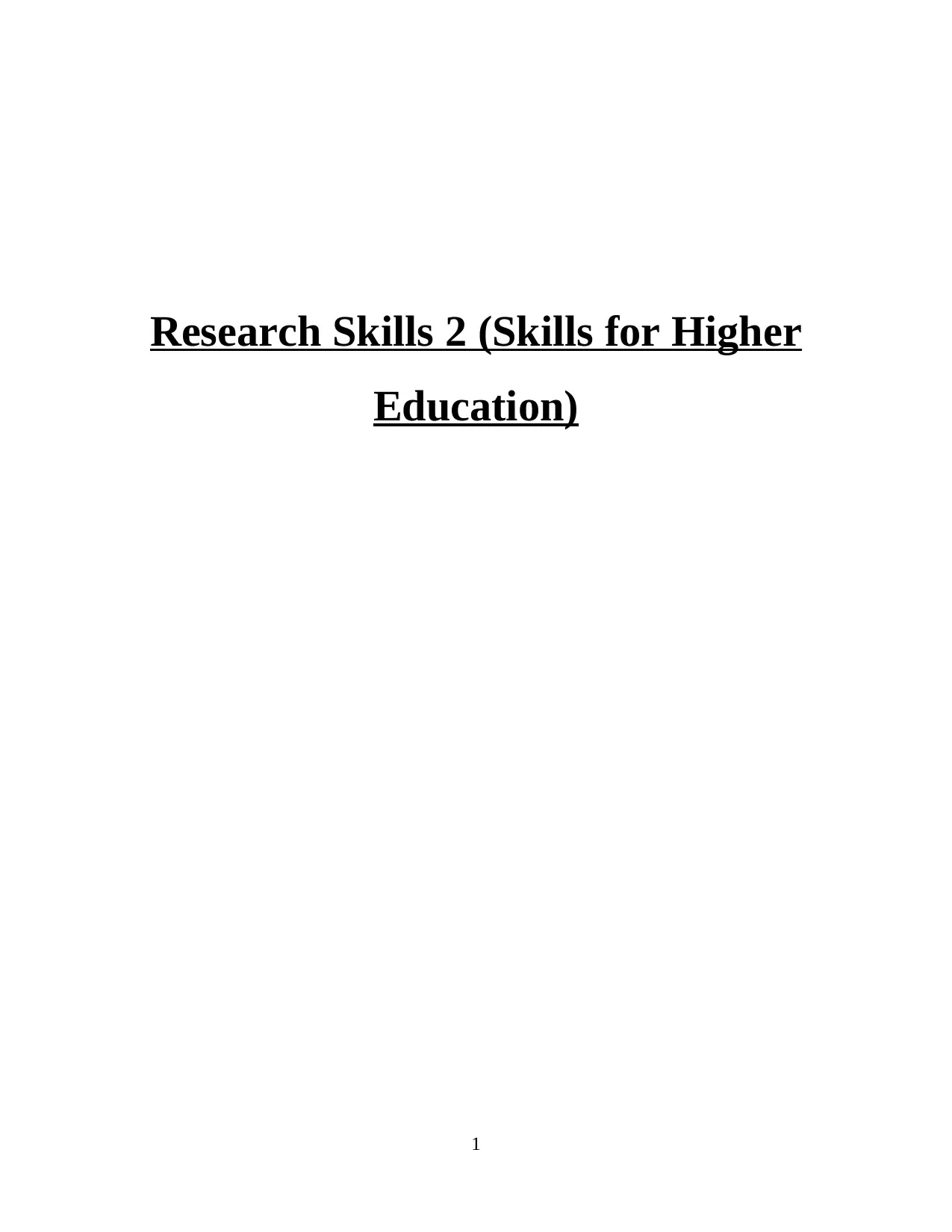
Research Skills 2 (Skills for Higher
Education)
1
Education)
1
Paraphrase This Document
Need a fresh take? Get an instant paraphrase of this document with our AI Paraphraser

Table of Contents
INTRODUCTION...........................................................................................................................3
Impacts of behavioural, environmental and personal factors of on performance hospitals.......3
CONCLUSION................................................................................................................................6
REFERENCES................................................................................................................................7
2
INTRODUCTION...........................................................................................................................3
Impacts of behavioural, environmental and personal factors of on performance hospitals.......3
CONCLUSION................................................................................................................................6
REFERENCES................................................................................................................................7
2
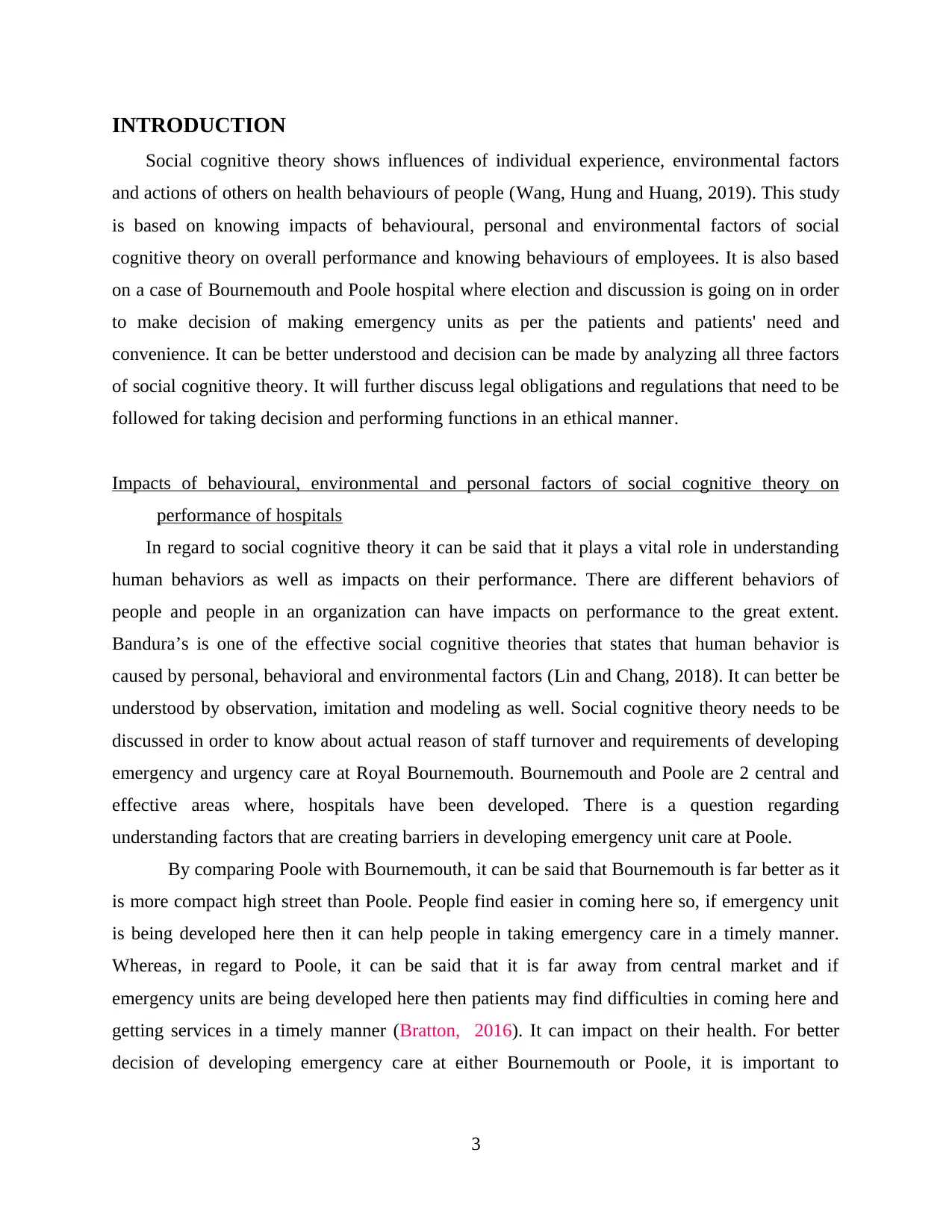
INTRODUCTION
Social cognitive theory shows influences of individual experience, environmental factors
and actions of others on health behaviours of people (Wang, Hung and Huang, 2019). This study
is based on knowing impacts of behavioural, personal and environmental factors of social
cognitive theory on overall performance and knowing behaviours of employees. It is also based
on a case of Bournemouth and Poole hospital where election and discussion is going on in order
to make decision of making emergency units as per the patients and patients' need and
convenience. It can be better understood and decision can be made by analyzing all three factors
of social cognitive theory. It will further discuss legal obligations and regulations that need to be
followed for taking decision and performing functions in an ethical manner.
Impacts of behavioural, environmental and personal factors of social cognitive theory on
performance of hospitals
In regard to social cognitive theory it can be said that it plays a vital role in understanding
human behaviors as well as impacts on their performance. There are different behaviors of
people and people in an organization can have impacts on performance to the great extent.
Bandura’s is one of the effective social cognitive theories that states that human behavior is
caused by personal, behavioral and environmental factors (Lin and Chang, 2018). It can better be
understood by observation, imitation and modeling as well. Social cognitive theory needs to be
discussed in order to know about actual reason of staff turnover and requirements of developing
emergency and urgency care at Royal Bournemouth. Bournemouth and Poole are 2 central and
effective areas where, hospitals have been developed. There is a question regarding
understanding factors that are creating barriers in developing emergency unit care at Poole.
By comparing Poole with Bournemouth, it can be said that Bournemouth is far better as it
is more compact high street than Poole. People find easier in coming here so, if emergency unit
is being developed here then it can help people in taking emergency care in a timely manner.
Whereas, in regard to Poole, it can be said that it is far away from central market and if
emergency units are being developed here then patients may find difficulties in coming here and
getting services in a timely manner (Bratton, 2016). It can impact on their health. For better
decision of developing emergency care at either Bournemouth or Poole, it is important to
3
Social cognitive theory shows influences of individual experience, environmental factors
and actions of others on health behaviours of people (Wang, Hung and Huang, 2019). This study
is based on knowing impacts of behavioural, personal and environmental factors of social
cognitive theory on overall performance and knowing behaviours of employees. It is also based
on a case of Bournemouth and Poole hospital where election and discussion is going on in order
to make decision of making emergency units as per the patients and patients' need and
convenience. It can be better understood and decision can be made by analyzing all three factors
of social cognitive theory. It will further discuss legal obligations and regulations that need to be
followed for taking decision and performing functions in an ethical manner.
Impacts of behavioural, environmental and personal factors of social cognitive theory on
performance of hospitals
In regard to social cognitive theory it can be said that it plays a vital role in understanding
human behaviors as well as impacts on their performance. There are different behaviors of
people and people in an organization can have impacts on performance to the great extent.
Bandura’s is one of the effective social cognitive theories that states that human behavior is
caused by personal, behavioral and environmental factors (Lin and Chang, 2018). It can better be
understood by observation, imitation and modeling as well. Social cognitive theory needs to be
discussed in order to know about actual reason of staff turnover and requirements of developing
emergency and urgency care at Royal Bournemouth. Bournemouth and Poole are 2 central and
effective areas where, hospitals have been developed. There is a question regarding
understanding factors that are creating barriers in developing emergency unit care at Poole.
By comparing Poole with Bournemouth, it can be said that Bournemouth is far better as it
is more compact high street than Poole. People find easier in coming here so, if emergency unit
is being developed here then it can help people in taking emergency care in a timely manner.
Whereas, in regard to Poole, it can be said that it is far away from central market and if
emergency units are being developed here then patients may find difficulties in coming here and
getting services in a timely manner (Bratton, 2016). It can impact on their health. For better
decision of developing emergency care at either Bournemouth or Poole, it is important to
3
⊘ This is a preview!⊘
Do you want full access?
Subscribe today to unlock all pages.

Trusted by 1+ million students worldwide
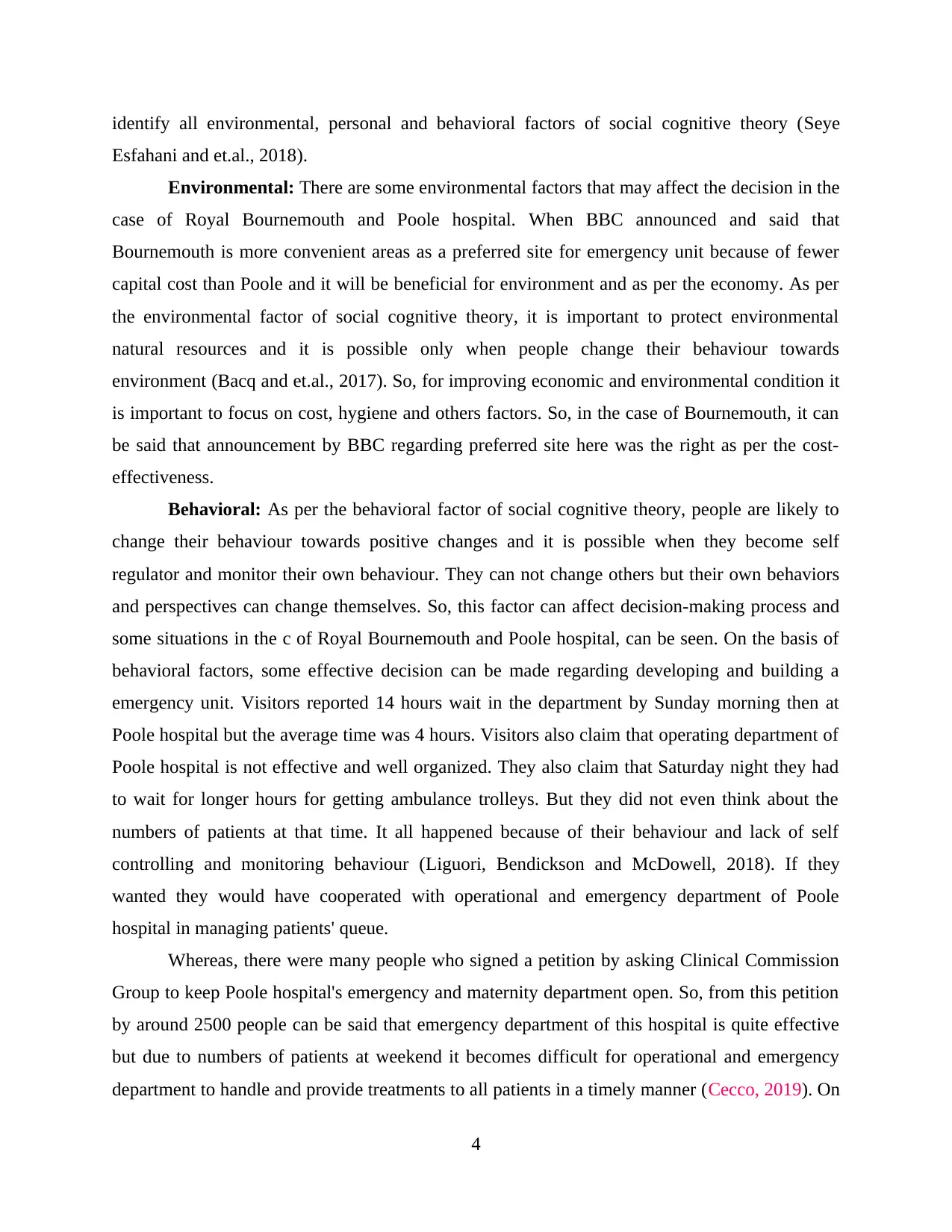
identify all environmental, personal and behavioral factors of social cognitive theory (Seye
Esfahani and et.al., 2018).
Environmental: There are some environmental factors that may affect the decision in the
case of Royal Bournemouth and Poole hospital. When BBC announced and said that
Bournemouth is more convenient areas as a preferred site for emergency unit because of fewer
capital cost than Poole and it will be beneficial for environment and as per the economy. As per
the environmental factor of social cognitive theory, it is important to protect environmental
natural resources and it is possible only when people change their behaviour towards
environment (Bacq and et.al., 2017). So, for improving economic and environmental condition it
is important to focus on cost, hygiene and others factors. So, in the case of Bournemouth, it can
be said that announcement by BBC regarding preferred site here was the right as per the cost-
effectiveness.
Behavioral: As per the behavioral factor of social cognitive theory, people are likely to
change their behaviour towards positive changes and it is possible when they become self
regulator and monitor their own behaviour. They can not change others but their own behaviors
and perspectives can change themselves. So, this factor can affect decision-making process and
some situations in the c of Royal Bournemouth and Poole hospital, can be seen. On the basis of
behavioral factors, some effective decision can be made regarding developing and building a
emergency unit. Visitors reported 14 hours wait in the department by Sunday morning then at
Poole hospital but the average time was 4 hours. Visitors also claim that operating department of
Poole hospital is not effective and well organized. They also claim that Saturday night they had
to wait for longer hours for getting ambulance trolleys. But they did not even think about the
numbers of patients at that time. It all happened because of their behaviour and lack of self
controlling and monitoring behaviour (Liguori, Bendickson and McDowell, 2018). If they
wanted they would have cooperated with operational and emergency department of Poole
hospital in managing patients' queue.
Whereas, there were many people who signed a petition by asking Clinical Commission
Group to keep Poole hospital's emergency and maternity department open. So, from this petition
by around 2500 people can be said that emergency department of this hospital is quite effective
but due to numbers of patients at weekend it becomes difficult for operational and emergency
department to handle and provide treatments to all patients in a timely manner (Cecco, 2019). On
4
Esfahani and et.al., 2018).
Environmental: There are some environmental factors that may affect the decision in the
case of Royal Bournemouth and Poole hospital. When BBC announced and said that
Bournemouth is more convenient areas as a preferred site for emergency unit because of fewer
capital cost than Poole and it will be beneficial for environment and as per the economy. As per
the environmental factor of social cognitive theory, it is important to protect environmental
natural resources and it is possible only when people change their behaviour towards
environment (Bacq and et.al., 2017). So, for improving economic and environmental condition it
is important to focus on cost, hygiene and others factors. So, in the case of Bournemouth, it can
be said that announcement by BBC regarding preferred site here was the right as per the cost-
effectiveness.
Behavioral: As per the behavioral factor of social cognitive theory, people are likely to
change their behaviour towards positive changes and it is possible when they become self
regulator and monitor their own behaviour. They can not change others but their own behaviors
and perspectives can change themselves. So, this factor can affect decision-making process and
some situations in the c of Royal Bournemouth and Poole hospital, can be seen. On the basis of
behavioral factors, some effective decision can be made regarding developing and building a
emergency unit. Visitors reported 14 hours wait in the department by Sunday morning then at
Poole hospital but the average time was 4 hours. Visitors also claim that operating department of
Poole hospital is not effective and well organized. They also claim that Saturday night they had
to wait for longer hours for getting ambulance trolleys. But they did not even think about the
numbers of patients at that time. It all happened because of their behaviour and lack of self
controlling and monitoring behaviour (Liguori, Bendickson and McDowell, 2018). If they
wanted they would have cooperated with operational and emergency department of Poole
hospital in managing patients' queue.
Whereas, there were many people who signed a petition by asking Clinical Commission
Group to keep Poole hospital's emergency and maternity department open. So, from this petition
by around 2500 people can be said that emergency department of this hospital is quite effective
but due to numbers of patients at weekend it becomes difficult for operational and emergency
department to handle and provide treatments to all patients in a timely manner (Cecco, 2019). On
4
Paraphrase This Document
Need a fresh take? Get an instant paraphrase of this document with our AI Paraphraser
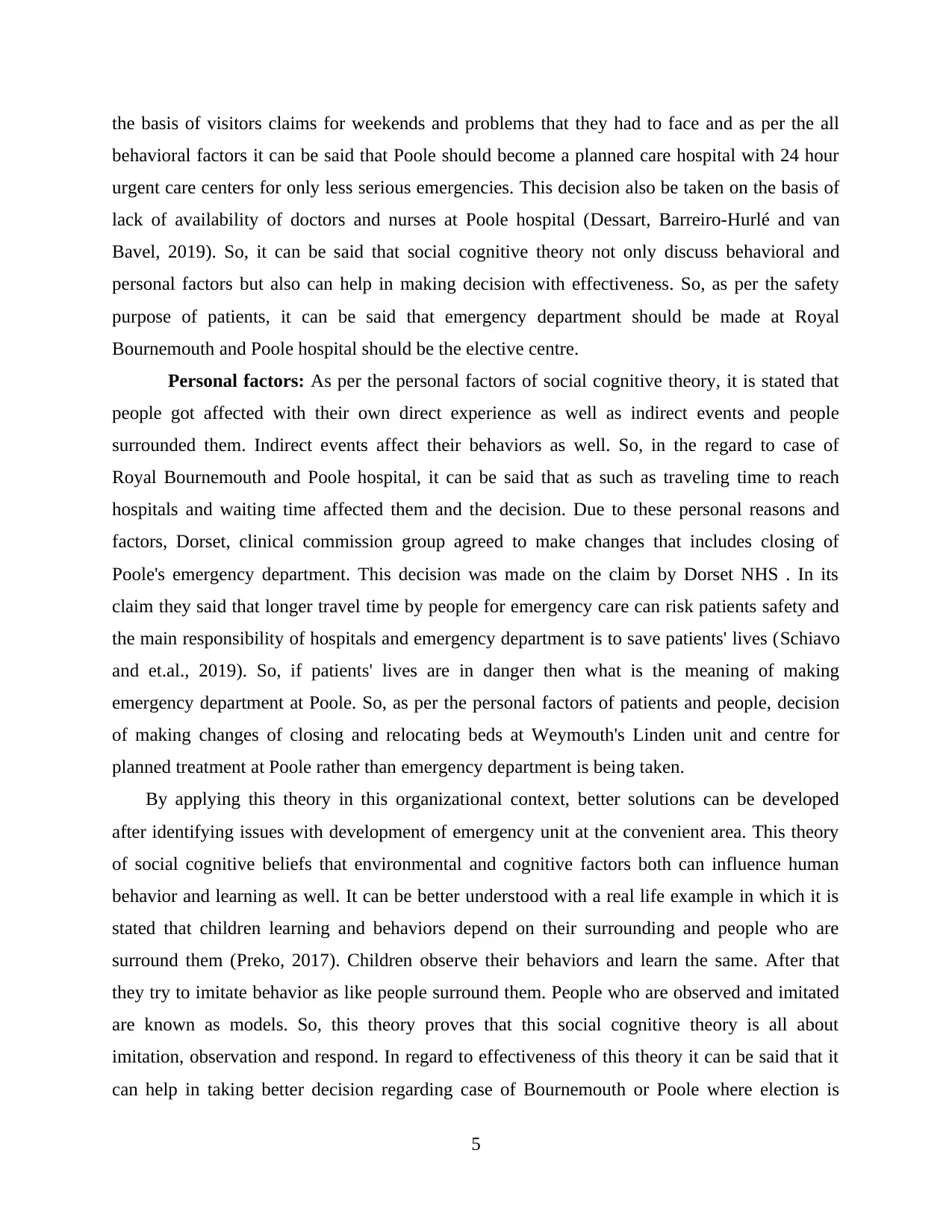
the basis of visitors claims for weekends and problems that they had to face and as per the all
behavioral factors it can be said that Poole should become a planned care hospital with 24 hour
urgent care centers for only less serious emergencies. This decision also be taken on the basis of
lack of availability of doctors and nurses at Poole hospital (Dessart, Barreiro-Hurlé and van
Bavel, 2019). So, it can be said that social cognitive theory not only discuss behavioral and
personal factors but also can help in making decision with effectiveness. So, as per the safety
purpose of patients, it can be said that emergency department should be made at Royal
Bournemouth and Poole hospital should be the elective centre.
Personal factors: As per the personal factors of social cognitive theory, it is stated that
people got affected with their own direct experience as well as indirect events and people
surrounded them. Indirect events affect their behaviors as well. So, in the regard to case of
Royal Bournemouth and Poole hospital, it can be said that as such as traveling time to reach
hospitals and waiting time affected them and the decision. Due to these personal reasons and
factors, Dorset, clinical commission group agreed to make changes that includes closing of
Poole's emergency department. This decision was made on the claim by Dorset NHS . In its
claim they said that longer travel time by people for emergency care can risk patients safety and
the main responsibility of hospitals and emergency department is to save patients' lives (Schiavo
and et.al., 2019). So, if patients' lives are in danger then what is the meaning of making
emergency department at Poole. So, as per the personal factors of patients and people, decision
of making changes of closing and relocating beds at Weymouth's Linden unit and centre for
planned treatment at Poole rather than emergency department is being taken.
By applying this theory in this organizational context, better solutions can be developed
after identifying issues with development of emergency unit at the convenient area. This theory
of social cognitive beliefs that environmental and cognitive factors both can influence human
behavior and learning as well. It can be better understood with a real life example in which it is
stated that children learning and behaviors depend on their surrounding and people who are
surround them (Preko, 2017). Children observe their behaviors and learn the same. After that
they try to imitate behavior as like people surround them. People who are observed and imitated
are known as models. So, this theory proves that this social cognitive theory is all about
imitation, observation and respond. In regard to effectiveness of this theory it can be said that it
can help in taking better decision regarding case of Bournemouth or Poole where election is
5
behavioral factors it can be said that Poole should become a planned care hospital with 24 hour
urgent care centers for only less serious emergencies. This decision also be taken on the basis of
lack of availability of doctors and nurses at Poole hospital (Dessart, Barreiro-Hurlé and van
Bavel, 2019). So, it can be said that social cognitive theory not only discuss behavioral and
personal factors but also can help in making decision with effectiveness. So, as per the safety
purpose of patients, it can be said that emergency department should be made at Royal
Bournemouth and Poole hospital should be the elective centre.
Personal factors: As per the personal factors of social cognitive theory, it is stated that
people got affected with their own direct experience as well as indirect events and people
surrounded them. Indirect events affect their behaviors as well. So, in the regard to case of
Royal Bournemouth and Poole hospital, it can be said that as such as traveling time to reach
hospitals and waiting time affected them and the decision. Due to these personal reasons and
factors, Dorset, clinical commission group agreed to make changes that includes closing of
Poole's emergency department. This decision was made on the claim by Dorset NHS . In its
claim they said that longer travel time by people for emergency care can risk patients safety and
the main responsibility of hospitals and emergency department is to save patients' lives (Schiavo
and et.al., 2019). So, if patients' lives are in danger then what is the meaning of making
emergency department at Poole. So, as per the personal factors of patients and people, decision
of making changes of closing and relocating beds at Weymouth's Linden unit and centre for
planned treatment at Poole rather than emergency department is being taken.
By applying this theory in this organizational context, better solutions can be developed
after identifying issues with development of emergency unit at the convenient area. This theory
of social cognitive beliefs that environmental and cognitive factors both can influence human
behavior and learning as well. It can be better understood with a real life example in which it is
stated that children learning and behaviors depend on their surrounding and people who are
surround them (Preko, 2017). Children observe their behaviors and learn the same. After that
they try to imitate behavior as like people surround them. People who are observed and imitated
are known as models. So, this theory proves that this social cognitive theory is all about
imitation, observation and respond. In regard to effectiveness of this theory it can be said that it
can help in taking better decision regarding case of Bournemouth or Poole where election is
5
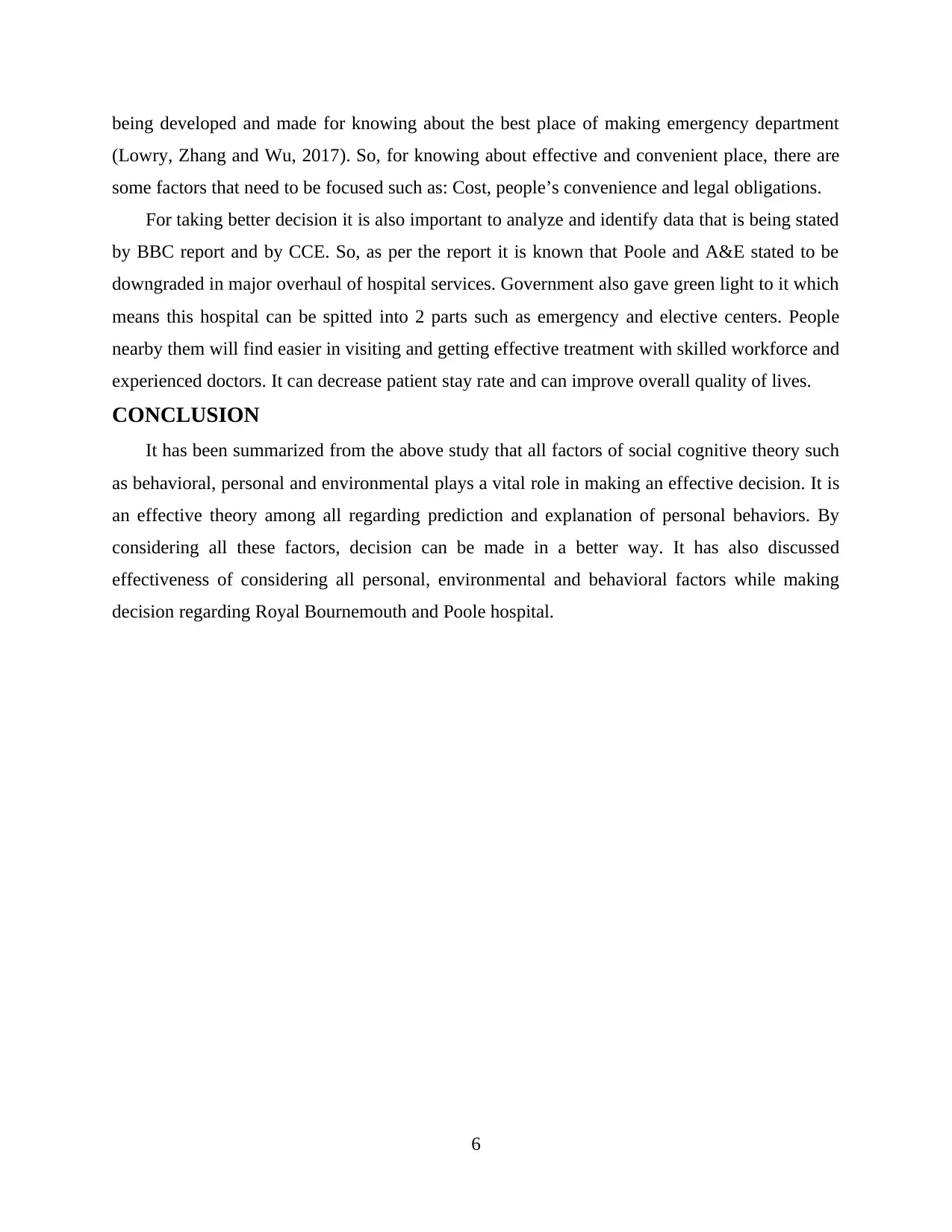
being developed and made for knowing about the best place of making emergency department
(Lowry, Zhang and Wu, 2017). So, for knowing about effective and convenient place, there are
some factors that need to be focused such as: Cost, people’s convenience and legal obligations.
For taking better decision it is also important to analyze and identify data that is being stated
by BBC report and by CCE. So, as per the report it is known that Poole and A&E stated to be
downgraded in major overhaul of hospital services. Government also gave green light to it which
means this hospital can be spitted into 2 parts such as emergency and elective centers. People
nearby them will find easier in visiting and getting effective treatment with skilled workforce and
experienced doctors. It can decrease patient stay rate and can improve overall quality of lives.
CONCLUSION
It has been summarized from the above study that all factors of social cognitive theory such
as behavioral, personal and environmental plays a vital role in making an effective decision. It is
an effective theory among all regarding prediction and explanation of personal behaviors. By
considering all these factors, decision can be made in a better way. It has also discussed
effectiveness of considering all personal, environmental and behavioral factors while making
decision regarding Royal Bournemouth and Poole hospital.
6
(Lowry, Zhang and Wu, 2017). So, for knowing about effective and convenient place, there are
some factors that need to be focused such as: Cost, people’s convenience and legal obligations.
For taking better decision it is also important to analyze and identify data that is being stated
by BBC report and by CCE. So, as per the report it is known that Poole and A&E stated to be
downgraded in major overhaul of hospital services. Government also gave green light to it which
means this hospital can be spitted into 2 parts such as emergency and elective centers. People
nearby them will find easier in visiting and getting effective treatment with skilled workforce and
experienced doctors. It can decrease patient stay rate and can improve overall quality of lives.
CONCLUSION
It has been summarized from the above study that all factors of social cognitive theory such
as behavioral, personal and environmental plays a vital role in making an effective decision. It is
an effective theory among all regarding prediction and explanation of personal behaviors. By
considering all these factors, decision can be made in a better way. It has also discussed
effectiveness of considering all personal, environmental and behavioral factors while making
decision regarding Royal Bournemouth and Poole hospital.
6
⊘ This is a preview!⊘
Do you want full access?
Subscribe today to unlock all pages.

Trusted by 1+ million students worldwide
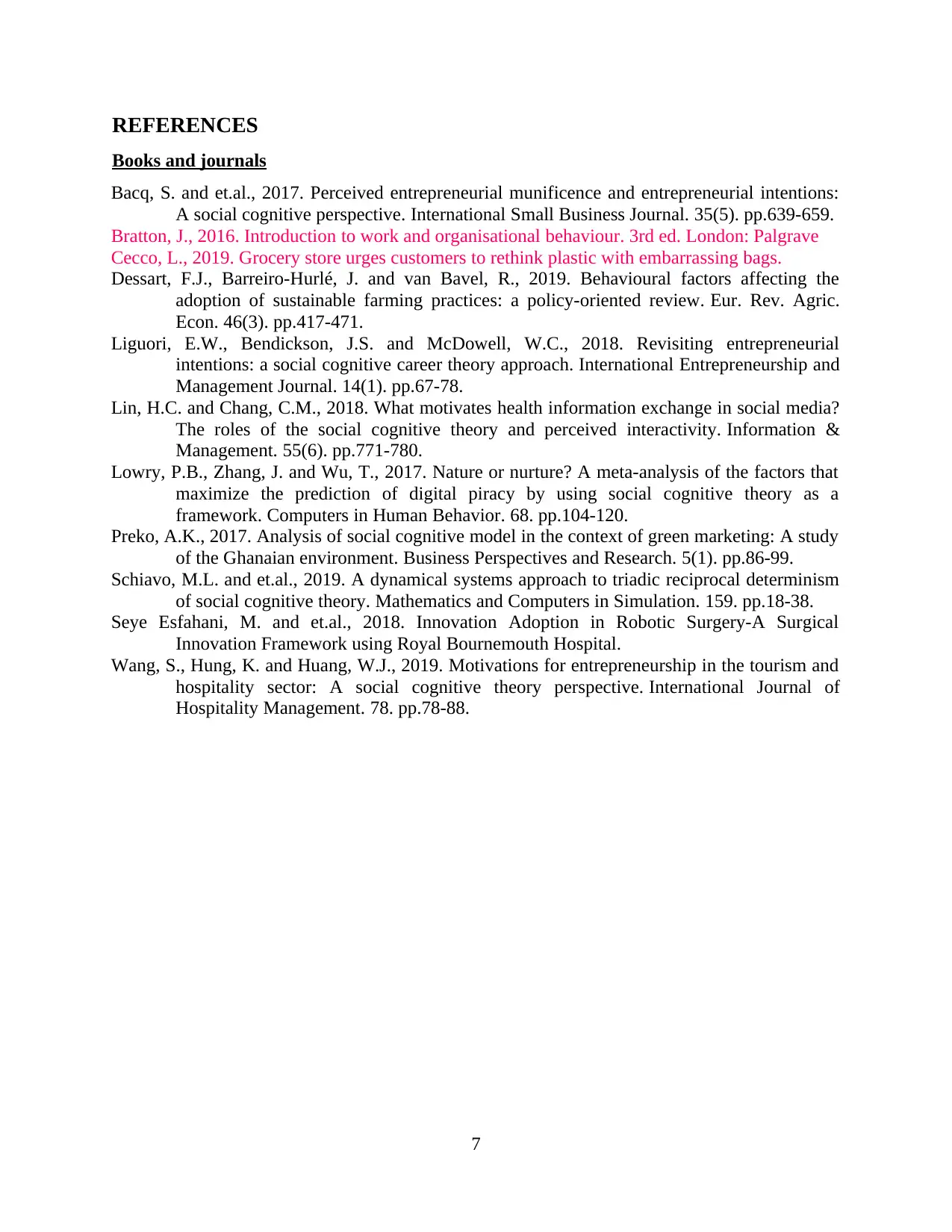
REFERENCES
Books and journals
Bacq, S. and et.al., 2017. Perceived entrepreneurial munificence and entrepreneurial intentions:
A social cognitive perspective. International Small Business Journal. 35(5). pp.639-659.
Bratton, J., 2016. Introduction to work and organisational behaviour. 3rd ed. London: Palgrave
Cecco, L., 2019. Grocery store urges customers to rethink plastic with embarrassing bags.
Dessart, F.J., Barreiro-Hurlé, J. and van Bavel, R., 2019. Behavioural factors affecting the
adoption of sustainable farming practices: a policy-oriented review. Eur. Rev. Agric.
Econ. 46(3). pp.417-471.
Liguori, E.W., Bendickson, J.S. and McDowell, W.C., 2018. Revisiting entrepreneurial
intentions: a social cognitive career theory approach. International Entrepreneurship and
Management Journal. 14(1). pp.67-78.
Lin, H.C. and Chang, C.M., 2018. What motivates health information exchange in social media?
The roles of the social cognitive theory and perceived interactivity. Information &
Management. 55(6). pp.771-780.
Lowry, P.B., Zhang, J. and Wu, T., 2017. Nature or nurture? A meta-analysis of the factors that
maximize the prediction of digital piracy by using social cognitive theory as a
framework. Computers in Human Behavior. 68. pp.104-120.
Preko, A.K., 2017. Analysis of social cognitive model in the context of green marketing: A study
of the Ghanaian environment. Business Perspectives and Research. 5(1). pp.86-99.
Schiavo, M.L. and et.al., 2019. A dynamical systems approach to triadic reciprocal determinism
of social cognitive theory. Mathematics and Computers in Simulation. 159. pp.18-38.
Seye Esfahani, M. and et.al., 2018. Innovation Adoption in Robotic Surgery-A Surgical
Innovation Framework using Royal Bournemouth Hospital.
Wang, S., Hung, K. and Huang, W.J., 2019. Motivations for entrepreneurship in the tourism and
hospitality sector: A social cognitive theory perspective. International Journal of
Hospitality Management. 78. pp.78-88.
7
Books and journals
Bacq, S. and et.al., 2017. Perceived entrepreneurial munificence and entrepreneurial intentions:
A social cognitive perspective. International Small Business Journal. 35(5). pp.639-659.
Bratton, J., 2016. Introduction to work and organisational behaviour. 3rd ed. London: Palgrave
Cecco, L., 2019. Grocery store urges customers to rethink plastic with embarrassing bags.
Dessart, F.J., Barreiro-Hurlé, J. and van Bavel, R., 2019. Behavioural factors affecting the
adoption of sustainable farming practices: a policy-oriented review. Eur. Rev. Agric.
Econ. 46(3). pp.417-471.
Liguori, E.W., Bendickson, J.S. and McDowell, W.C., 2018. Revisiting entrepreneurial
intentions: a social cognitive career theory approach. International Entrepreneurship and
Management Journal. 14(1). pp.67-78.
Lin, H.C. and Chang, C.M., 2018. What motivates health information exchange in social media?
The roles of the social cognitive theory and perceived interactivity. Information &
Management. 55(6). pp.771-780.
Lowry, P.B., Zhang, J. and Wu, T., 2017. Nature or nurture? A meta-analysis of the factors that
maximize the prediction of digital piracy by using social cognitive theory as a
framework. Computers in Human Behavior. 68. pp.104-120.
Preko, A.K., 2017. Analysis of social cognitive model in the context of green marketing: A study
of the Ghanaian environment. Business Perspectives and Research. 5(1). pp.86-99.
Schiavo, M.L. and et.al., 2019. A dynamical systems approach to triadic reciprocal determinism
of social cognitive theory. Mathematics and Computers in Simulation. 159. pp.18-38.
Seye Esfahani, M. and et.al., 2018. Innovation Adoption in Robotic Surgery-A Surgical
Innovation Framework using Royal Bournemouth Hospital.
Wang, S., Hung, K. and Huang, W.J., 2019. Motivations for entrepreneurship in the tourism and
hospitality sector: A social cognitive theory perspective. International Journal of
Hospitality Management. 78. pp.78-88.
7
1 out of 7
Related Documents
Your All-in-One AI-Powered Toolkit for Academic Success.
+13062052269
info@desklib.com
Available 24*7 on WhatsApp / Email
![[object Object]](/_next/static/media/star-bottom.7253800d.svg)
Unlock your academic potential
Copyright © 2020–2025 A2Z Services. All Rights Reserved. Developed and managed by ZUCOL.




